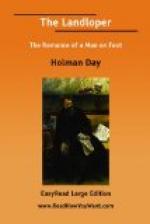He wondered just what disposition was made of children left in this manner.
If the woman had relatives who were forced to take the child it meant more of this horrible tenement life. The child in his arms was pale and thin; her bones seemed as inconsiderable as a bird’s.
He did not know much about children’s homes, orphanages, institutions for the reception of the homeless, but it seemed to him that such a tiny, frail little girl would be very, very lonely in such a place.
The skies grew dark without. He was cramped because he had sat for hours in one position, fearing to waken her. But when he moved she did not waken—he did not understand how soundly childhood can sleep. He laid her on the foot of the narrow bed and looked about the room, shielding a match with his hands. He had resolved to carry her out of that fetid, overcrowded babel of a tenement. Where? He did not know. He hunted to find her belongings. He found a few clothes. There was no receptacle in which he could pack them. He folded them and crowded the articles in his pockets. He stuffed in the doll and the rude playthings and hooked the basket doll-carriage upon his arm. She did not waken when he picked her up. He tiptoed down the stairs and nobody noticed him, In his own dizzy mind he could not determine whether he felt most like a thief or a lunatic. At any rate, he found himself walking the streets of the mill city at ten o’clock at night, carrying a little girl in his arms and all her earthly possessions in his pockets.
It came over him at last that the longer he kept her the more uncertain he became as to what disposal he should make of her, or else he was more loath to part with her; he didn’t exactly know which.
Then she woke and spoke for the first time. “Me is te’bble hungry—and firsty,” she mourned.
“Good Lord! What’s the matter with me?” grunted the young man. “If I had found a cat or a dog, the first thing I would have done would be to give ’em something to eat. I reckon I must have thought I had picked up an angel.” To her he said, smoothing her hair with his free hand. “We’ll have sumpin for baby’s tummy mighty quick.” He flushed at sound of that baby prattle from his lips. But it had popped out in the most natural manner possible.
He headed for the nearest night lunch-cart. He entered with his burden.
He elbowed aside men who were eating sandwiches and pie at the counter. With complete and rueful knowledge as to the extent of his resources, he ordered a bowl of bread and milk—“the best you can do for a hungry kiddie for ten cents,” he added.
“Anything for yourself?” inquired the waiter.
He shook his head and paid for the child’s supper with his whole capital, two nickels. He held her on the end of the counter and, awkwardly but with tender carefulness, fed the bread and milk to her with a spoon. A healthy man’s hunger gnawed within him and the savor of coffee from the big, bubbling urn tantalized him. He tipped the bowl to her lips and she drank the last of the milk with a happy little sigh, and he went out into the night again, carrying her in his arms.




